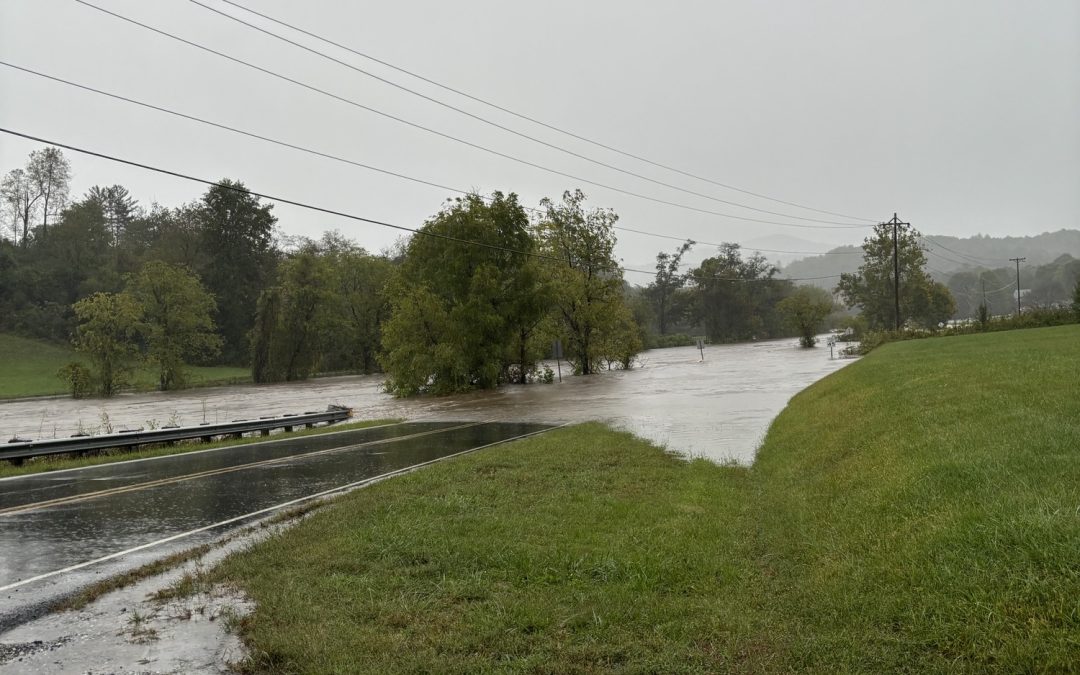This story is a collection of our communication department student workers’ thoughts and emotions on the events of Hurricane Helene.
Although we are back to school now and are grateful our students and staff are safe we understand the hurt that remains in our surrounding community. Communication plays a large part in our daily lives, including reflecting and sharing our experiences amid tragedy.
Mykala Anderson:
What do you do when it happens to you?
Hurricane Helene devastated the mountainous region of Western North Carolina on Sept. 26, leaving many people without homes, places of work and grieving loved ones.
A hurricane or tropical storm reaching the mountains with such impact is something people were not prepared for, no matter what the forecast showed.
Areas of Alexander, Alleghany, Ashe, Avery, Buncombe, Burke, Caldwell, Catawba, Clay, Cleveland, Gaston, Haywood, Henderson, Jackson, Lincoln, Macon, Madison, McDowell, Mitchell, Polk, Rutherford, Transylvania, Watauga, Wilkes, Yancey and the Eastern Band of Cherokee Indians were affected, qualifying for state and federal relief assistance.
Within three days, over a foot of rain was reported in areas like Boone and Asheville and nearly two to three feet in Rutherford and Busick counties. Flooding, evacuations, landslides and mudslides plagued the region.
Staple buildings and towns are reduced to boards and memories.
I grew up in Weaverville, I am familiar with the Asheville backroads, I go to college at Western Carolina University.
These mountains, this community is home.
In the first few nights after Helene, service was down, water was limited in some areas, gas was low in surrounding stations and it was intense to see what the next move. How were people going to react?
Although there were some dark spots in humanity resulting in looting and fights, the predominant response was joy and community.
In their darkest moments of loss and hurt, people saw each other and found ways to communicate and pitch in.
Without technology, we, as college students, resorted to leaving notes and knocking on doors. We rediscovered face-to-face communication. We listened to the radio, we watched DVDs, we played board games.
We talked.
We helped.
We processed.
Once roads and communication pathways began to reopen, we began to volunteer and find ways to provide relief.
People who were strangers days before were crying with one another, shoveling dirt, praying over each other, sharing burdens and laughter and simply partaking in humanity.
When you only hear about natural disasters and devastations, it is difficult to know how you will respond if it ever happens to you.
However, if you do experience the hurt and destruction, you have the opportunity to see how little material things matter, and how important interpersonal communication and relationships are.
No matter the difficulty a hug or hand can make a difference in your day. And an open mind and a willing heart can provide a new understanding.
Anna Bowie:
Hurricane Helene was surreal for me. Thankfully, most of WCU and I were safe, but I had no idea how bad everything else was. This was mainly because we lost cell service and internet connection. That was one of the first clues for me that the storm had severe impacts.
I remember that at noon that Friday, I lost service and Wi-Fi. I thought it would be temporary, but after waiting hours, I realized that was not the case. By Saturday morning, I was worried sick about my family and fiancé. I cautiously drove toward Waynesville to figure out how to contact them.
About 20 minutes into my drive, I saw dozens of cars on the side of the road. Then I saw the service bars appear on my phone. Like all the other cars, I pulled off the road and quickly made my phone calls.
Of course, my family and fiancé were relieved I was safe, but then I realized how impacted the surrounding areas were. My Dad tearfully told me that some towns were gone, cell service providers were flooded and destroyed, entire power grids were gone and so many lives were impacted. It felt unreal to see my town relatively alright, but knowing only a few miles away so much was gone.
This experience made me realize two interesting parts about communication. One was that people will always find a way to get information. People who went out and could contact the ‘outside’ could bring that information back to those who could not go out, like I did with my roommate. Likewise, those on the ‘outside’ relied on those who went out to get information on who was safe and how to help.
Second, we rely heavily on digital communication channels, and when we do not have that immediate message relay, it can cause concern and stress. However, when one channel is removed other channels tend to become used more, such as the increase of face-to-face communication seen during this time.
Although this time is difficult, and we all have been impacted, it is heartwarming to see how crucial and supportive communication has been for many.
Maci Cooper:
Experiencing a hurricane in Western North Carolina was not something I thought I would ever do. In this part of the state, we are usually not in the path of hurricanes or tropical storms, we usually just get the remnants and leftover rain from them and that is the extent of it.
In the days leading up to when the hurricane hit, not many people were too worried about what was coming for us, mainly because no one expected it to be this bad.
I remember going to class on Tuesday and Wednesday thinking it was just going to be some heavy rain, and professors thought the same.
On Wednesday evening, we all received an email saying that classes were canceled that Thursday and Friday due to the hurricane.
Still, I was not too worried because I figured it was more out of a precaution to keep us from driving in heavy rain.
We had steady rain for a couple of days prior to the outer bands of Helene and the hurricane itself moved its way up here, so that of course was not good.
Thursday night, I went to bed around 11 p.m. just when the rain was starting to pick up a little. It had been raining all day, and continued into the night.
Early Friday morning, around 8 a.m., I woke up and looked out the window and saw some trees swaying, but only light rain. I still had power, but realized we had no water when I went to use the restroom.
I remember thinking to myself this was not too bad, but little did I know at the time just how bad it was.
At this moment, I still had signal for about another couple hours or so. I do not remember the time exactly, but around lunchtime is when all signal and wifi was lost and western NC was disconnected from the outside world.
I thought it was just my phone at first, so I just kept restarting it and thinking it was a problem with my phone.
A couple hours later, I saw my roommates and they said the same thing was happening to them. They left to go to check on her friends, and I did not see them again for several hours, which frightened me, because I had no idea what was going on.
In this era, we are not used to not being able to call or text and check on people.
I decided to drive around and see what damage was done around the area, but the main roads were okay.
Cullowhee Creek and Tuckaseegee flooded, but driving to Sylva did not look too bad. I started looking for places to eat, and realized everywhere is closed except Walmart.
At this point, I was very confused and wanted to know how bad everything was and what had happened.
I arrived at Walmart to a sign from Chancellor Brown updating us on everything. It made me happy that she and the university made an effort to communicate to us by paper, since there was no other way to reach students at the time (especially off-campus residences).
Walmart had some signal, but my phone never works in Walmart for some reason, so I could not tell my loved ones I was okay yet.
For some reason, it still had not hit me on how bad things were.
I did not have many groceries so I was trying to brainstorm on what would be open nearby (I assumed campus was closed, so I did not even try for whatever reason because I was out of it).
It was Saturday evening after the storm. Sylva was closed and Dillsboro was closed, so the next thing I thought of was Cherokee.
The roads were clear the whole way, but I did notice that the river was really high.
I wanted to go to the Cherokee Casino because I figured they would have generators, power, food, water and cell service unless they got hit badly. Luckily, they had all of the above.
As soon as I walked in and connected my phone to the wifi, tons of notifications popped up on my phone from loved ones worried about me asking if I was okay and alive.
This worried me because that meant the hurricane really did some damage to other places.
I still had not seen the news and was not able to get information from others due to being disconnected, so I responded “Yes, I am okay and alive. Was it that bad?”
Then, people sent me pictures and videos of news in Asheville, Chimney Rock, Black Mountain and other places who were absolutely devastated.
It then began to sink in how bad everything was.
Two days later, I decided to make the trek home to Charlotte, North Carolina with many road closures, trees down and no signal.
I thought about using a paper map, but that would have done no good with the road closures.
After 6 hours of driving around trying to make my way to I-85 in Georgia, I made it home.
I was relieved to be home, but was in the unknown about what was next.
I would have never imagined being out of school for three weeks including fall break.
I am thankful school is back in session and we are together again, but my heart goes out to the people of Western North Carolina who got it way worse than we did.

